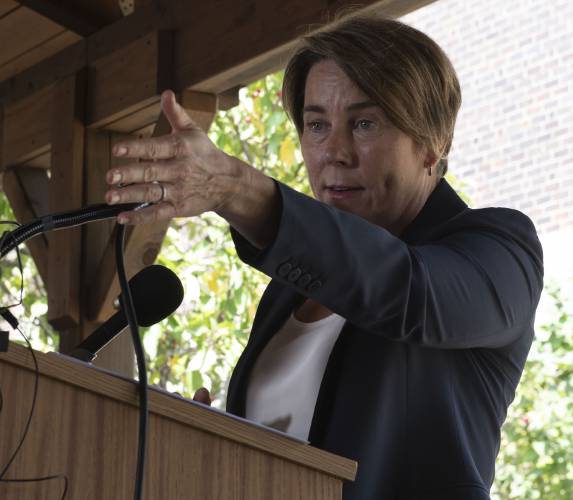Healey unveils ‘historic’ HERO bill to expand supports for veterans

Gov. Maura Healey this week unveiled a bill to expand support for hundreds of thousands of veterans. GAZETTE FILE PHOTO
| Published: 11-10-2023 5:06 PM |
BOSTON — Calling it “historic,” Gov. Maura Healey unveiled legislation this week — timed to coincide with Veterans Day — that will increase benefits, modernize services and promote inclusivity for hundreds of thousands of Massachusetts veterans.
Filed ahead of Veterans Day on Saturday, the governor’s omnibus bill — which she dubbed the “Honoring, Empowering and Recognizing Our Servicemembers and Veterans,” or HERO Act — includes 17 spending, policy and tax initiatives that, among other things, seek to provide additional support, particularly for women, disabled and LGBTQ+ veterans.
“Our veterans have sacrificed so much for our country, and this transformative legislation marks an important step toward ensuring that Massachusetts supports them in return,” Healey said in announcing the HERO Act.
Some key provisions of the legislation include expanding access to behavioral health treatment, increasing benefits for disabled veterans, bolstering support for businesses that hire veterans, updating the definition of a veteran, expanding the scope of the Veterans Equality Review Board, initiating a pilot program for LGBTQ+ couples denied IVF reimbursement by the Veterans Health Administration, and codifying medical and dental benefits.
The job of veterans’ services secretary became a full Cabinet-level position under a 2022 law earlier this year, with Secretary Jon Santiago the first to serve in the executive office role.
“This is an exciting day,” said John Paradis of the Veterans Advocacy Coalition. “I’d like to thank Governor Healey and Secretary Santiago for their tenacious support and for their outreach to the veteran community.”
The pilot program seeks to reimburse same-sex couples who use in-vitro fertilization to have a child.
The U.S. Department of Veterans Affairs covers IVF procedures for certain veterans with service-connected conditions that result in infertility, but current VA and Department of Defense rules exclude people who are unmarried or in same-sex couples from infertility coverage.
Article continues after...
Yesterday's Most Read Articles
 Scott Brown: Road to ruin for Northampton schools
Scott Brown: Road to ruin for Northampton schools
 Around Amherst: High school sleuths point out $2M mistake in town budget
Around Amherst: High school sleuths point out $2M mistake in town budget
 Mayor’s budget boosts schools 8.5%: Advocates protest coming job cuts as spending falls short of demands
Mayor’s budget boosts schools 8.5%: Advocates protest coming job cuts as spending falls short of demands
 Michigan man indicted on alleged $1M construction fraud of Northampton company
Michigan man indicted on alleged $1M construction fraud of Northampton company
 Fire at Rainbow Motel in Whately leaves 17 without a home
Fire at Rainbow Motel in Whately leaves 17 without a home
 Rutherford Platt and Barbara Kirchner: ‘Magical thinking’ in downtown Northampton
Rutherford Platt and Barbara Kirchner: ‘Magical thinking’ in downtown Northampton
The bill would also launch a working group to explore “long-term solutions in response to the federal policy excluding same-sex couples.”
A lawsuit making its way through federal courts would push the U.S. agency to cover the assisted reproductive treatment. LGBTQ+ and unmarried veterans are suing the VA for “discriminatory and arbitrary” policies.
Healey’s bill would also expand the scope of the Veterans Equality Review Board beyond “Don’t Ask, Don’t Tell” discharges, the administration said, to include discharges related to military sexual trauma, post-traumatic stress disorder, traumatic brain injury, mental health conditions or HIV discharges.
“By promoting inclusivity and expanding benefits, we’re not only showing our gratitude to veterans but also addressing their evolving needs,” Lt. Gov. Kim Driscoll said in a statement. “This legislative package represents a significant step forward in the care and support we provide to our veterans, particularly for women and LGBTQ+ veterans.”
Veterans also would have expanded access to behavioral health treatment and increased financial benefits under Healey’s bill.
She is proposing seven initiatives to expand benefits, including allowing veterans to be reimbursed for visits to outpatient behavioral health providers, and increasing the annual annuity payments for veterans with a service-connected disability, surviving spouses, or Gold Star parents who lost their children in military service, from $2,000 to $2,500.
Additionally, the bill would increase a tax credit for small businesses that hire unemployed or low-income veterans to $2,500. Eligible veterans include those receiving SNAP benefits, “chronically unemployed veterans,” and unemployed veterans who are disabled.
Cities and towns would also have two new local options for veterans property tax exemptions: to double the tax exemption without doubling all other exemption clauses, or to tie the annual property tax abatement amount to inflation.
The bill seeks to broaden the state’s legal definition of a veteran, allowing more people to be eligible for benefits.
As for behavioral health, the bill would also establish a working group to study “alternative therapies” — such as psilocybin, or psychedelic mushrooms — in treating veterans suffering from mental health disorders.

 A groundbreaking anniversary: Northampton couple reflects on lead role in legalization of same-sex marriage in Massachusetts 20 years ago
A groundbreaking anniversary: Northampton couple reflects on lead role in legalization of same-sex marriage in Massachusetts 20 years ago Multiverse of style: Volante Design in Easthampton has a mission to make jackets that anyone can wear anytime
Multiverse of style: Volante Design in Easthampton has a mission to make jackets that anyone can wear anytime  Consumer Corner with Anita Wilson: AT&T breach a cautionary tale
Consumer Corner with Anita Wilson: AT&T breach a cautionary tale  Making news in business, May 16
Making news in business, May 16
